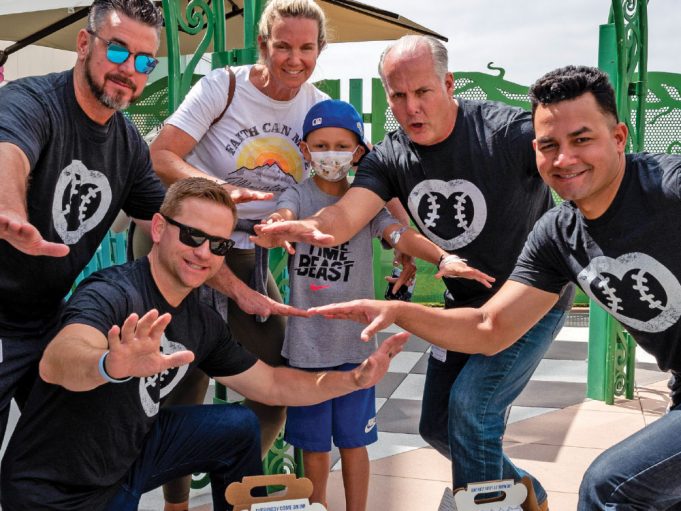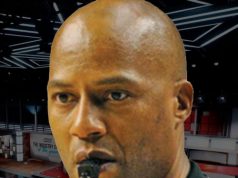It is often said every dark cloud has a silver lining. Good things come from the darkest places sometimes. In 1999, one of the darkest days for Major League Baseball umpires occurred. In an attempt to force negotiations with MLB for a new labor agreement, 57 umpires resigned. The AL and NL immediately hired new umpires, however. The umpires tried to rescind their resignations, but it was too late. Ultimately, 22 of them were let go, and their resignations were seen as final.
However, out of that dark moment came an extremely positive light. Those resignations and the ensuing layoffs sowed the seeds for something much bigger. What started as a program to help umpires who lost their jobs in the labor dispute paved the way for what officially became UMPS CARE Charities in 2006, a life-changing endeavor to provide major league support to at-risk youth, children with cancer and other serious illnesses, foster care children and military families. In addition, UMPS CARE supports families facing financial need within the baseball community.
It is a major undertaking, considering umpires are on the road for roughly seven to eight months of the year, constantly in and out of airports and hotels and in a different city every weekend. But it is in those chaotic months when the true character of the umpires is both defined and revealed.
“I don’t have words in my vocabulary to describe the hearts and minds of the umpires,” 22-year veteran MLB umpire Paul Emmel said. “Everyone wants to evaluate your contribution through how much money you give. Being on the board, the amount of time and effort and thought that every single umpire on staff, including the minor league umpires, I mean the time they put in is overwhelming to speak about.”
It is those contributions that led to UMPS CARE Charities being recognized as the 2020-21 NASO Gold Whistle Award recipient. It is only the second time a group and not an individual has been recognized for the award, and the first since 2006 (when it was awarded to the V Foundation’s Blow the Whistle on Cancer program), speaking to the impressive work the charity has accomplished.
“The dedication that the major league umpires deliver to UMPS CARE has impacted thousands of young people and families in need,” Commissioner of Baseball Robert D. Manfred Jr. said in a statement to Referee. “It has always been a pleasure to see the organization’s exemplary service to others in the communities of our game. On behalf of Major League Baseball, I congratulate the umpires and the staff of UMPS CARE on this great honor from the National Association of Sports Officials.”
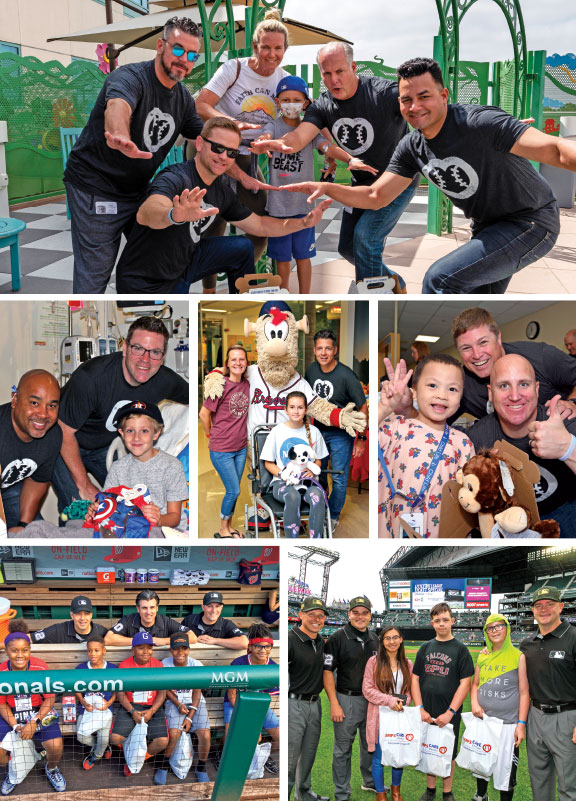 UMPS CARE, which is based in Edgewater, Md., has a relatively small full-time staff, which makes the outreach even more impressive. Comprised of executive director Jennifer Skolochenko-Platt, program director Jennifer Jopling and marketing manager business administrator Amy Rosewater, the three-person staff is busy trying to coordinate schedules with umpires who are scattered all over the country. Along with the full-time staff, the charity also has Deanna Reynolds, wife of MLB crew chief and UMPS Care Vice President Jim Reynolds, as volunteer coordinator. It takes a lot of planning, trust and coordination to make everything run as smoothly as it does. On top of the outreach programs, the charity is busy planning fundraising events (such as golf tournaments, bowling events, auctions, and virtual Steaks and Stories events that allow spectators the opportunity to hear some of the best stories in umpiring straight from those involved). And it takes a well-coordinated effort to pull off so many events successfully.
UMPS CARE, which is based in Edgewater, Md., has a relatively small full-time staff, which makes the outreach even more impressive. Comprised of executive director Jennifer Skolochenko-Platt, program director Jennifer Jopling and marketing manager business administrator Amy Rosewater, the three-person staff is busy trying to coordinate schedules with umpires who are scattered all over the country. Along with the full-time staff, the charity also has Deanna Reynolds, wife of MLB crew chief and UMPS Care Vice President Jim Reynolds, as volunteer coordinator. It takes a lot of planning, trust and coordination to make everything run as smoothly as it does. On top of the outreach programs, the charity is busy planning fundraising events (such as golf tournaments, bowling events, auctions, and virtual Steaks and Stories events that allow spectators the opportunity to hear some of the best stories in umpiring straight from those involved). And it takes a well-coordinated effort to pull off so many events successfully.
“Without those four, we’d be sunk,” Emmel said. “We are umpires. We don’t know how to run a charity. To have that staff is incredible.”
Prior to UMPS CARE attaining nonprofit status, the umpires informally held events — mostly attending hospitals to visit sick children and giving underprivileged children the opportunity to see ballgames in person. Those two programs ultimately merged into one when UMPS CARE became a formalized charity in 2006. And since that time, those two programs have continuously grown and more outreach programs have been added to give back.
“We are in the process of growing,” Skolochenko-Platt said. “It has been quite a journey from when I came on board in 2012 to now. The coolest part of this is it started a revolution, in a good way. It created this amazing ripple effect. That ripple is continuing to grow.”
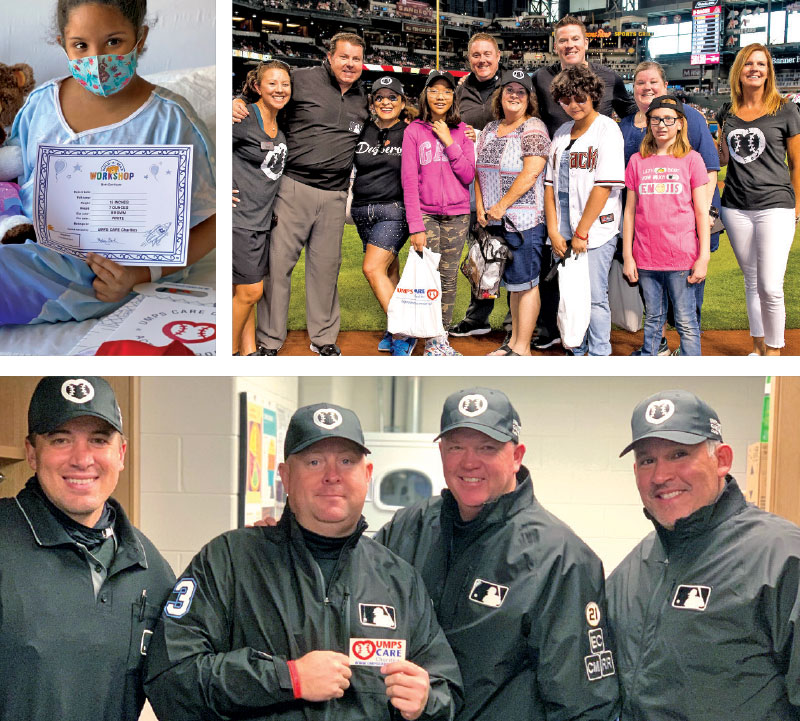
Blue For Kids
One of the flagship programs for UMPS CARE, and perhaps its most impactful, is the Blue for Kids program. Especially for a child, hospital visits can be a frightening time. UMPS CARE is working hard to make that experience a little less upsetting and help bring smiles to children and their families. As umpires travel across the country, the program brings crews to the bedside of children with life-threatening illnesses. And the umpires bring a Build-A-Bear Workshop with them to allow children to outfit stuffed teddy bears, puppies or monkeys, all while sharing words of encouragement and helping take the families’ minds off the hospital for a bit. The umpires also bring the host cities’ team mascot with them to the hospital when the mascot is available.
“The kids love it,” Rosewater said. “How can you not? They light up. They are kids who are involved in medical treatments and having chemotherapy. And then these guys come in and make their day.”
UMPS CARE made its 175th hospital visit with a trip to Chicago this summer and set up a hospital visit to coincide with the MLB All-Star game in Denver. Since its inception in 2006, the program has donated over 17,500 Build-A-Bears and generally makes about 15 visits each season. And while the children get a positive boost by having the umpires bring them a furry friend, it may just be the parents that get the bigger pick-me-up.
 “The parents are more moved than the kids,” said Gary Darling, a 28-year MLB umpire who retired in 2014 and is the current president of UMPS CARE. “The parents are the ones I’ve noticed are very appreciative of the guys going there and spending time with them for a bit. The parents’ reaction has been most impactful. Someone else does care and takes a little pain away from what their children are going through. Numerous parents have written emails after or meet us in the hallway and are almost crying, thanking us for being there. The parents can see they aren’t doing this by themselves and others care about their kids.”
“The parents are more moved than the kids,” said Gary Darling, a 28-year MLB umpire who retired in 2014 and is the current president of UMPS CARE. “The parents are the ones I’ve noticed are very appreciative of the guys going there and spending time with them for a bit. The parents’ reaction has been most impactful. Someone else does care and takes a little pain away from what their children are going through. Numerous parents have written emails after or meet us in the hallway and are almost crying, thanking us for being there. The parents can see they aren’t doing this by themselves and others care about their kids.”
Even COVID-19 couldn’t stop UMPS CARE from delivering smiles to children. During the pandemic, UMPS CARE teamed up with its Child Life partners to make sure the special deliveries still happened, often setting up Zoom calls or closed-captioned television with kids to allow question-and-answer sessions. In addition to the bears, UMPS CARE provided baseball-themed activity books and branded boxes of crayons to bring some sense of normalcy to the hospital playrooms.
“It is so heartwarming because most of us have kids,” Emmel said. “From the kids’ perspective, when you go into a hospital, especially those hospitals, you don’t get to make choices anymore. The doctors choose everything for you. To walk in with those bears and outfits and tell parents, ‘You don’t get to choose, the kid gets to choose.’ The mere decision-making process they haven’t experienced in so long, it wakes those kids up. It puts smiles on their faces. Those little human experiences don’t make the papers, but they’re there in every hospital visit.”
Blue Crew Tickets
While baseball is all about the “boys of summer,” there are some kids who live in the shadows of major league ballparks and never have the opportunity to go see a game. UMPS CARE created a program called Blue Crew Tickets, which aims to change that. At-risk youth, children battling chronic illness, kids in foster care and military families in every major league market get the opportunity to go behind the scenes with the umpires and create a lifetime memory.
The program started and was founded through the efforts of Mike DiMuro, a 20-year MLB umpire who retired in 2019, Marvin Hudson, a 22-year MLB veteran umpire, and Samuel Dearth, a former MiLB umpire and former executive director of UMPS CARE. Hudson and Dearth umpired in the minor leagues together and when Hudson made it to the majors, Dearth, who had become a Big Brother with Big Brothers/Big Sisters, brought his Little Brother to the game and gave him a behind-the-scenes look at the ballpark.
“They kind of started that program through that experience and it has really evolved,” Rosewater said. “There are over 800 participants a year. Just that one child and one Big Brother made a huge difference and a huge impact.”
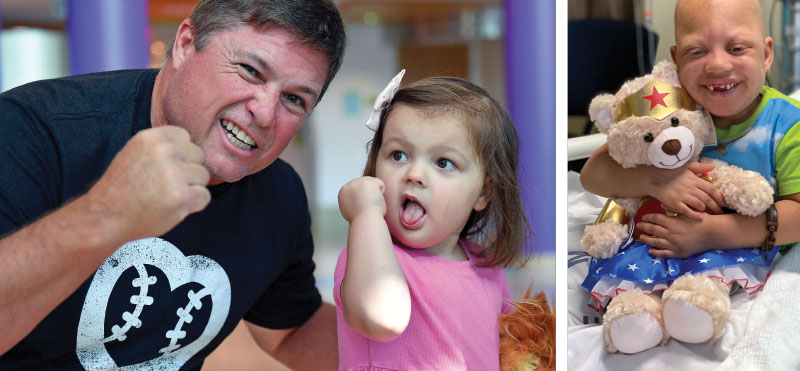
Since its inception, umpires have welcomed over 8,000 participants to enjoy a major league ballgame. And in 2019, all 30 Triple-A teams partnered with UMPS CARE to give more opportunities. The flexibility at that level allows participants the opportunity to be involved in some really unique opportunities such as participating in the plate conference or getting to say, “Play ball,” before the start of the game.
“These are neat elements to the game,” Rosewater said. “Understanding what umpires have to do to prepare, especially if they are behind the plate that day. A general fan doesn’t even realize what goes into it.”
During the 2020 season and the beginning of the 2021 season, COVID-19 severely impacted the normalcy of major league games. UMPS CARE, however, adapted and created some unique opportunities. UMPS CARE set up 15 different chat sessions between umpires and 307 participants, giving a virtual opportunity to ask questions and interact with umpires. In essence, the Blue Crew Ticket program became the Virtual Blue Crew Ticket Program. Through its partnership with Topps Baseball Cards, UMPS CARE was able to provide those participants with their own virtual baseball cards to make the interaction with the umpires even more special.
These opportunities for kids are truly life changing. Seven years ago, Emmel was in San Francisco for a series at now Oracle Park. Prior to the game, Emmel had a chance to interact with a group of at-risk youth and show them around the park thanks to the Blue Crew Ticket program. In that short amount of time prior to the game, those few minutes ended up meaning everything to those kids.
“These kids are very quiet, very timid and have no voice,” Emmel said. “They see themselves as inconspicuous and Pablo Sandoval came over and spoke in Spanish to the kids and translated, ‘I know you are on this side of the big, brick wall and you never thought you’d see yourself on that side. Most of the players out here came from humble beginnings as well.’ The kids went from feeling insignificant to a superstar telling them, ‘I came from humble beginnings and look where I am now.’ It is truly life-changing to me, and that’s where I’d like to see the ticket program go. And it is.”
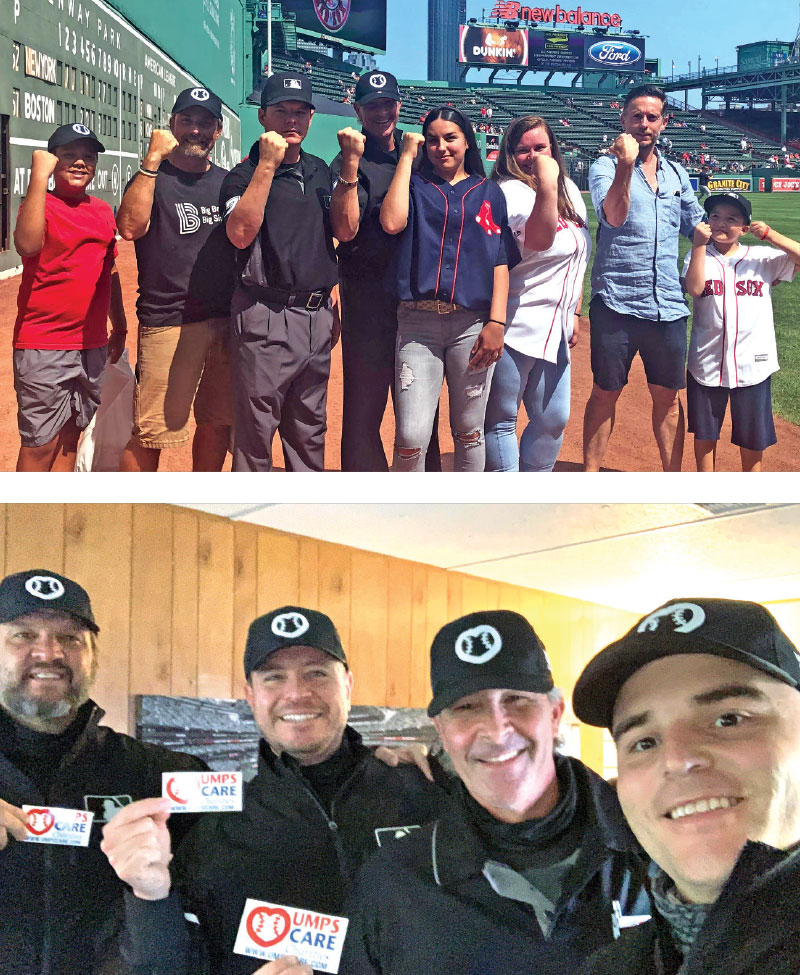
All-Star Scholarship
Emmel, who has been on the board of UMPS CARE for four years and has been the secretary for the past three years, has made major contributions to the charity, especially to the scholarship program. In the past, the charity awarded scholarship money, but he said there really wasn’t a rhyme or reason to how the money was used and some of the scholarship recipients had dropped out.
“I took a hard look at the scholarship program we have and I wanted to move the charity from just giving back to actually changing lives,” Emmel said. “We really need a better return on investment for our program. To do that, we had to change the program from giving away money to actually helping these kids graduate. Having them come back and help with the committee and grow the committee with their experience through the program. We went from a giveaway to actually changing lives.”
The updated scholarship program, called the All-Star College Scholarship, is for children adopted later in life and provides a college education to students who might not otherwise be able to afford one. The scholarship is for children adopted at or after the age of 13 and each year, one student is selected to receive a $10,000 scholarship. That money annually goes toward tuition, books and other college-related expenses. Since its inception, UMPS CARE has given $282,500 to scholarship recipients.
UMPS CARE awarded $40,000 in scholarship funding in 2019 and 2020 and will be awarding the same in 2021. The 2019 recipient, Vitalik Walle, fit perfectly into Emmel’s criteria. Walle was one of 20 applicants and his resume stood out to the scholarship committee. His parents died when he was very young and he was placed in an orphanage in Ukraine. He lived in the orphanage for nearly 10 years before being adopted by a Colorado family when he was 15. He is currently a junior at Colorado Christian University and hopes to become a police officer upon graduation.
The 2020 scholarship award was special for UMPS CARE as it lost one of its own following the 2019 season. Eric Cooper, a 20-year MLB veteran and instrumental member of the UMPS CARE team, died after developing a blood clot following off-season knee surgery. The 2020 All-Star Scholarship was named in his memory in an effort to carry on his legacy. Cooper had a major impact on the raising of funds for the 2020 scholarship prior to his passing.
The 2020 scholarship was awarded to Marcus Lo from Palm Beach, Calif., who attends the University of Southern California. Lo’s mother died when he was 4 and his father died while Lo was in middle school. His uncle initially adopted him and cared for him, but ultimately Lo moved in with his grandmother. Lo was a unanimous decision for the scholarship as he started his own nonprofit and even went on a mission trip to China and Korea shortly after his father died to assist children living in group homes.
“The scholarship program really makes a life-changing impact,” Darling said. “It’s not just a smile for the day but it is setting them up for adult lifehood. Paul (Emmel) has taken over that program and made it more efficient and made great choices. I wish we had enough money to give numerous scholarships every year. The hard part is trying to figure out which one is best as so many are deserving.”
Official Leadership Program
One of the newest programs for UMPS CARE is the Official Leadership Program. According to Rosewater, the idea for the program emerged during COVID-19, which provided a pause for the charity to look at what it was doing. What emerged was a program that kicked off this summer in three cities. The new program aims to provide a solution to a nationwide problem — the growing shortage of officials impacting all youth sports. This new program provides leadership skills and employment opportunities for underserved youth.
The pilot programs launched at MLB Youth Academies in Washington, D.C., and Houston, and the DREAM Charter School in New York City, in June. The six-week course offers both classroom and onfield instruction. UMPS CARE partnered with MiLB umpire Jen Pawol and her Evolve Junior Umpire Program to teach umpire mechanics so the students will be able to umpire baseball and softball games at the conclusion of the course. The goal is to encourage, engage and mentor the teens and help them develop leadership qualities, connect them with employment opportunities and to mentor them through the process of becoming an official and beyond.
“I am most proud that UMPS CARE took the time to look at the problems facing the world of umpiring and developed a thoughtful way to be a part of the solution,” Skolochenko-Platt said. “There is a huge shortage of youth sports officials across the country. By training and recruiting these young people, we hope to help diversify the base of umpires, introduce officiating to teens who otherwise may not be aware of the craft and offer them a direct line to jobs in the field. In the process, we are removing as many barriers as possible and connecting them with mentors to set them up for success.”
While the program is still in its infancy, UMPS CARE is hoping to expand the program and create a lasting legacy that will help more teens.
“We hope to continue to grow this program and expand into new markets with the goal of developing more teens from underserved communities to become leaders on and off the field,” Skolochenko-Platt said.
For all of those programs to work effectively, it takes a lot of volunteer hours. In 2020, umpires donated 1,378 volunteer hours to the charity. Through May of this year, 944 volunteer hours have been donated. As the charity continues to grow and find new ways to outreach, that number will continue to grow. And as it grows, UMPS CARE continues to work with other professional organizations to help impact the communities in which they live.
“They are generously showing others how to be leaders, not just within the officiating industry, but outside of the industry as well,” said Barry Mano, founder and president of NASO. “They are shining a light on what a group of individuals can do when they are committed to something. They are classic Gold Whistle material.”
What's Your Call? Leave a Comment:
Note: This article is archival in nature. Rules, interpretations, mechanics, philosophies and other information may or may not be correct for the current year.
This article is the copyright of ©Referee Enterprises, Inc., and may not be republished in whole or in part online, in print or in any capacity without expressed written permission from Referee. The article is made available for educational use by individuals.

